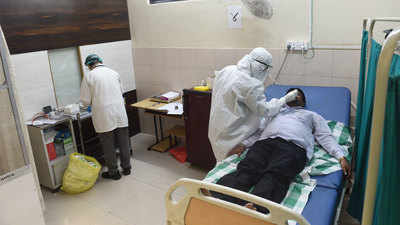Trending
This story is from August 18, 2020
Pune’s first sero-survey shows 51.5% citizens have Covid antibodies
The city’s very first sero-survey, carried out to assess Covid-19’s spread in certain areas, has found antibodies in 51.5% of residents who were picked for the study. Presence of Covid-specific antibodies reveals that a person has had the infection.

PUNE: The city’s very first sero-survey, carried out to assess Covid-19’s spread in certain areas, has found antibodies in 51.5% of residents who were picked for the study.
Presence of Covid-specific antibodies reveals that a person has had the infection.
The ‘Epidemiological and Serological Surveillance of Covid-19 in Pune’ studied samples from 1,664 people across five high-incidence areas within the Pune Municipal Corporation.Seropositivity in residents from these areas ranged between 36.1% and 65.4%.
The Lohianagar-Kasewadi area (under the Bhavani Peth ward office) had the highest prevalence of Covid-19 among the selected locations. “Our findings indicate that there has been an extensive spread of Covid-19 in these prabhags,” said Aurnab Ghose, a senior researcher who was part of the survey team.
Ghose added, “We detected the presence of IgG antibodies against SARS-CoV-2. This indicates past infection, but does not necessarily suggest immunity from subsequent infection.”
The researchers said the number of confirmed cases on July 1, within the administrative zones of the PMC (known as prabhags), were considered the baseline for the study. Blood samples were collected between July 20 and August 5.
“These samples were then processed to detect the presence of IgG antibodies against the receptor-binding domain (RBD) of the viral spike protein using the RBD-ELISA assay,” stated the survey report.
The RBD-ELISA analysis, used only for research purposes, specifically looks for IgG antibodies that have responded to SARS-CoV-2, the virus which causes Covid-19.
The sero-survey has helped uncover details that have the potential to shape authorities’ response to the pandemic.
Results show the spread has occurred across all types of dwellings. A seropositivity of 49% was registered among people living in bungalows; it ranged between 56% and 62% among those living in clustered hutments. Prevalence was low among residents of apartments — at 33%.
Also, prevalence was high (62.2%) among those with access only to common toilets. It was relatively lower (45.3%) among those with independent toilets.
There was also no substantial difference in spread between men and women. Males who were part of the survey registered a seropositivity of 52.8% while women showed 50.1%. Those above 66 had a lower prevalence of just 39.8%.
“Results from the study will be used to plan our future course of action. The lower prevalence in senior citizens is a good sign. It will help us reduce the death rate among this section of the population, which has high comorbidity problems,” said divisional commissioner Saurabh Rao.
There are more such sero-surveys planned for the region. The PCMC is expected to launch a massive study, involving 5,000 citizens, within the next few days.
Presence of Covid-specific antibodies reveals that a person has had the infection.
The ‘Epidemiological and Serological Surveillance of Covid-19 in Pune’ studied samples from 1,664 people across five high-incidence areas within the Pune Municipal Corporation.Seropositivity in residents from these areas ranged between 36.1% and 65.4%.
The Lohianagar-Kasewadi area (under the Bhavani Peth ward office) had the highest prevalence of Covid-19 among the selected locations. “Our findings indicate that there has been an extensive spread of Covid-19 in these prabhags,” said Aurnab Ghose, a senior researcher who was part of the survey team.
The study was led by the Pune Municipal Corporation and experts from Indian Institute of Science Education and Research (IISER). Its findings were announced at a press conference on Monday.
Ghose added, “We detected the presence of IgG antibodies against SARS-CoV-2. This indicates past infection, but does not necessarily suggest immunity from subsequent infection.”
The researchers said the number of confirmed cases on July 1, within the administrative zones of the PMC (known as prabhags), were considered the baseline for the study. Blood samples were collected between July 20 and August 5.
“These samples were then processed to detect the presence of IgG antibodies against the receptor-binding domain (RBD) of the viral spike protein using the RBD-ELISA assay,” stated the survey report.
The RBD-ELISA analysis, used only for research purposes, specifically looks for IgG antibodies that have responded to SARS-CoV-2, the virus which causes Covid-19.
The sero-survey has helped uncover details that have the potential to shape authorities’ response to the pandemic.
Results show the spread has occurred across all types of dwellings. A seropositivity of 49% was registered among people living in bungalows; it ranged between 56% and 62% among those living in clustered hutments. Prevalence was low among residents of apartments — at 33%.
Also, prevalence was high (62.2%) among those with access only to common toilets. It was relatively lower (45.3%) among those with independent toilets.
There was also no substantial difference in spread between men and women. Males who were part of the survey registered a seropositivity of 52.8% while women showed 50.1%. Those above 66 had a lower prevalence of just 39.8%.
“Results from the study will be used to plan our future course of action. The lower prevalence in senior citizens is a good sign. It will help us reduce the death rate among this section of the population, which has high comorbidity problems,” said divisional commissioner Saurabh Rao.
There are more such sero-surveys planned for the region. The PCMC is expected to launch a massive study, involving 5,000 citizens, within the next few days.
End of Article
FOLLOW US ON SOCIAL MEDIA











